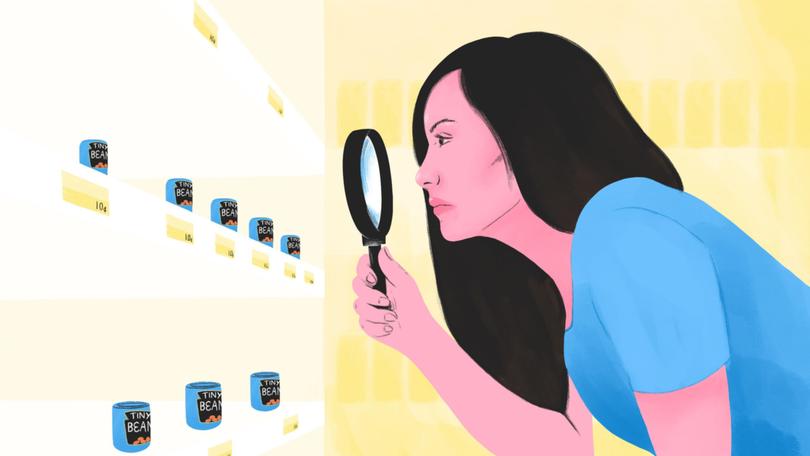GEMMA ACTON: It’s time to channel our inner beer drinkers and fight back against shrinkflation
Feel powerless against increasing process and diminishing product sizes? Then take a leaf out of beer drinkers’ book.

I can stop blaming my toddler. It seems a key reason we’re running through paper towel at an alarming rate in our household is not because cleaning is her favourite activity, but because there’s actually less of it in each roll.
Heard this story before? A few months ago? Early last year? You’re right, we’re here again, already.
Shrinkflation has a long and undistinguished history. The concept of charging the same price for a smaller version of the same product was first flagged during the economic troubles of 1970s Britain although the practice of sneakily shafting a buyer by providing less than they had been conditioned to expect has probably been going on for millennia.
Sign up to The Nightly's newsletters.
Get the first look at the digital newspaper, curated daily stories and breaking headlines delivered to your inbox.
By continuing you agree to our Terms and Privacy Policy.Consumer advocates at Choice recently published a list of some notable offenders so far this year (remember it is still only March) with the usual products making up the list.
Narrower rolls of paper towel, shorter rolls of toilet paper, lighter boxes of cereal and smaller bags of chips were all there, alongside more petite hot cross buns and diminished bottles of bathroom cleaner.
Every few months there’s a tweaked list of offenders and every year a variation of the same excuses are trotted out by retailers, manufacturers or advocates of the practice.
It’s true, manufacturing costs do go up from time to time. But they also go down and we certainly don’t see the size of the product silently go up in lockstep and remain at the same price. In fact, if a manufacturer has surreptitiously been able to shrink a product enough over time, there’s even the potential to introduce a whole new bigger size at — of course — a higher price point.
Some argue that it’s for the environment that they’re decreasing the size of products although often you’ll find there’s no (or minimal) change to the actual packaging, it’s just the product inside.
Your money is suddenly buying you less of the good and more air inside the same sized package. The argument that shrinkflation helps with portion control is also raised periodically by health advocates who point to the latest statistics showing two in three Australians are overweight or obese.
Beer drinkers. were responsible for some of the most impressive shrinkflation sleuthing and shaming Australia has ever seen.
I find every one of these observations and excuses insulting. If you believe these are defensible or even laudable reasons for delivering us less for the same price, then announce it with the same fanfare you attach to your sales promotions. Or at the very least, a meek apology and a statement of gratitude to your loyal customers.
While we can appreciate that some manufacturers are genuinely having a tough time with price inflation, so are we, your customers. So extend us the courtesy of informing us when you change the economics of buying certain products and allow us to make a properly informed decision.
Think we should be doing more to help the environment? By all means, then flag your actions and let us decide whether your product is still the most attractive option for us.
Think we should eat less? Give us the option if you like but make it clear that we’re getting fewer calories for our buck so we can choose whether or not to go down the forcibly calorie-controlled route.
We have busy lives and we can’t keep on top of every change to the price and composition of products we regularly buy.
I get it, that’s the game. That’s why manufacturers prefer shrinkflation to the more easily recognisable sticker price inflation.
It’s rational for a manufacturer or retailer to get away with whatever they can but why hasn’t more been done to protect consumers from those who wield that sort of power? Why isn’t it compulsory to disclose that we’re getting a worse deal?
There are all sorts of regulations preventing deceptive and misleading practices in other areas of consumer law so it makes no sense why customers are left to fend for themselves when it comes to a tactic that clearly fits under those buckets and affects us on a daily basis.
French supermarket group Carrefour took matters into its own hands last year alerting shoppers with shameful, garish stickers to products which had experienced shrinkflation. In Spain and Hungary, the law requires supermarkets to enlighten their customers.
The ongoing ACCC review into supermarket pricing has invited customers to also offer their thoughts on shrinkflation so we’ll wait to see whether anything comes out of that which discourages manufacturers or retailers from using the device as a regularly employed strategy to drive profitability.
In the absence of any immediate policy action, we should all take a leaf out of the effective actions of one cohort of dedicated beer drinkers. They were responsible for some of the most impressive shrinkflation sleuthing and shaming Australia has ever seen.
Back in 2012, Victoria Bitter fans were quick to notice when owner Carlton & United Breweries sneakily slashed the alcohol content of its brew from 4.9 per cent to 4.6 per cent. Outraged customers forced the company to restore the original alcohol level and even take out full page ads apologising.
In management’s own words which demonstrated admirable self-awareness: “We got it wrong”.
Gemma Acton is the Seven Network’s finance editor.

